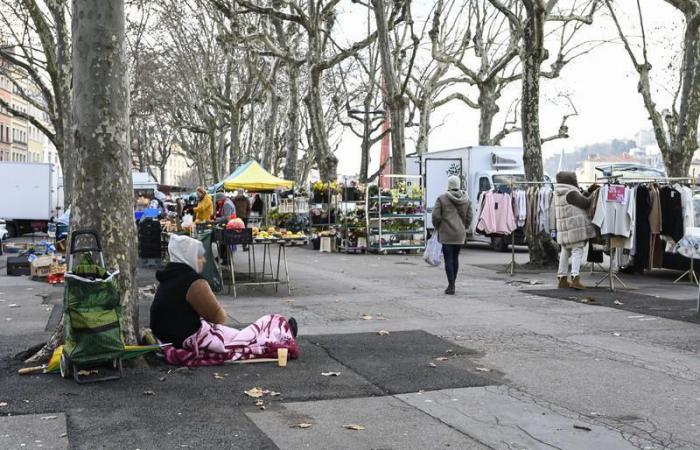In France, five million people, half of whom are under 30, live on less than 1,000 euros per month, or 8.1% of the population. What realities do these figures cover, in terms of daily deprivations, housing, access to health, culture, leisure? This is detailed in the report from the Observatory of Inequalities published on December 3.
Concretely, almost two thirds of the lowest 20% say they do not have the financial means to cover an unexpected expense of 1,000 euros. 56% cannot afford to replace their worn-out furniture and 53% cannot afford a week's vacation away from home. A third cannot, due to lack of money, have a regular leisure activity and 12% cannot afford to heat their home properly.
Globally, “ poverty is not exploding, it is gaining ground », Indicates researchers from the Observatory of Inequalities: in 20 years, the poverty rate has increased by 1.5 points, the number of poor people increasing from four to five million. And the standard of living of the poorest, inflation deducted, has deteriorated. In 2002, 50% of the poor earned less than 772 euros per month after social benefits. In 2022, this median standard of living is 832 euros, or only 60 euros additional.
Young people, single mothers and people with disabilities on the front lines
Those most exposed to poverty are young people, single-parent families (almost all headed by women), people deprived of employment, those with immigrant backgrounds and those who do not have a diploma ( 81% of the poor have not gone beyond the baccalaureate). Singles are twice as affected as couples. Finally, one in five disabled people is poor, compared to 13% of able-bodied people.
From a geographical point of view, poor people are concentrated in urban and peri-urban areas and the overseas departments are particularly impacted by poverty which affects 36.1% of Reunion Islanders, a proportion three times higher than 'in mainland France. Mayotte (77%) and Guyana (53%) are in even more dramatic situations (2017 data).
Prominent among the causes of the trend increase in poverty is the increase in the share of forced household expenses (housing costs, insurance and financial services, telecommunications and television expenses, school canteen costs, etc.).
This increased from 13% at the start of the 1960s to 28% in 2022, according to INSEE. These expenses have almost never stopped rising due to the rise in rents, but also the rise in the prices of electricity, gas and all other housing-related charges. “This progression partly corresponds to an improvement in housing, but also to an enrichment of landlords”underlines the report.
A migration policy that creates exclusion
On the “revenue” side, one of the main causes of the increase in poverty is the deterioration of employment: “we reduced unemployment through flexibility, precariousness and underpaid jobs », denounce the authors of the report. Furthermore, the tightening of migration policies prevents foreigners who have been established in France for years from working.
“The French Republic is thus congesting accommodation centers and leaving thousands of people on the street, including many children. The dissonance is immense between the values of human rights and what is at stake every evening for all those who, after dialing 115, face rejection (when they have an answer) and must go through the process. night outside », tackles the Observatory of Inequalities.
Indeed, extreme poverty persists in France with 330,000 homeless people, who live on the streets, in social hotels or in accommodation centers. Faced with this situation, housing assistance, food and clothing distribution associations are today reaching their limits. “ This subcontracting of social action is justified in certain cases, when it makes it possible to meet local emergency needs thanks to more detailed knowledge of the field. It is no longer so when the State abandons what it should do and when it is necessary to act on a large scale everywhere », support the authors of the report, who recommend lasting measures on the part of the public authorities.
An issue of social cohesion
The Observatory of Inequalities therefore proposes to ensure at least an income equivalent to the poverty threshold, i.e. 1,000 euros monthly for a single person. “ This would amount to spending around 10 billion euros, half as much as the shortfall for public finances due to the abolition of the housing tax », argue the researchers.
Another option: re-regulate the labor market and penalize companies, such as public services, which abuse mass insecurity. And of course, it seems essential to “relaunch a social housing policy worthy of the name” while our country still has four million poorly housed people, according to the Abbé Pierre Foundation.
Urgent measures at a time when two decades of increasing poverty and stagnation of low incomes weigh heavily on the prospects and the feeling of abandonment of popular categories by political leaders.
The media that billionaires can't afford
We are not funded by any billionaire. And we are proud of it! But we face ongoing financial challenges. Support us! Your donation will be tax-free: giving €5 will cost you €1.65. The price of a coffee.
I want to know more!






